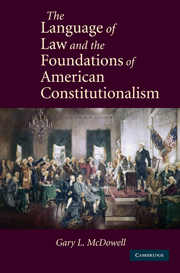Book contents
- Frontmatter
- Contents
- Preface and Acknowledgments
- The Language of Law and the Foundations of American Constitutionalism
- Introduction: The Politics of Original Intention
- 1 The Constitution and the Scholarly Tradition: Recovering the Founders' Constitution
- 2 Nature and the Language of Law: Thomas Hobbes and the Foundations of Modern Constitutionalism
- 3 Language, Law, and Liberty: John Locke and the Structures of Modern Constitutionalism
- 4 The Limits of Natural Law: Modern Constitutionalism and the Science of Interpretation
- 5 The Greatest Improvement on Political Institutions: Natural Rights, the Intentions of the People, and Written Constitutions
- 6 Chains of the Constitution: Thomas Jefferson, James Madison, and the “Political Metaphysics” of Strict Construction
- 7 The Most Sacred Rule of Interpretation: John Marshall, Originalism, and the Limits of Judicial Power
- 8 The Same Yesterday, Today, and Forever: Joseph Story and the Permanence of Constitutional Meaning
- Epilogue: The Moral Foundations of Originalism
- Index of Cases
- General Index
- References
7 - The Most Sacred Rule of Interpretation: John Marshall, Originalism, and the Limits of Judicial Power
Published online by Cambridge University Press: 05 June 2012
- Frontmatter
- Contents
- Preface and Acknowledgments
- The Language of Law and the Foundations of American Constitutionalism
- Introduction: The Politics of Original Intention
- 1 The Constitution and the Scholarly Tradition: Recovering the Founders' Constitution
- 2 Nature and the Language of Law: Thomas Hobbes and the Foundations of Modern Constitutionalism
- 3 Language, Law, and Liberty: John Locke and the Structures of Modern Constitutionalism
- 4 The Limits of Natural Law: Modern Constitutionalism and the Science of Interpretation
- 5 The Greatest Improvement on Political Institutions: Natural Rights, the Intentions of the People, and Written Constitutions
- 6 Chains of the Constitution: Thomas Jefferson, James Madison, and the “Political Metaphysics” of Strict Construction
- 7 The Most Sacred Rule of Interpretation: John Marshall, Originalism, and the Limits of Judicial Power
- 8 The Same Yesterday, Today, and Forever: Joseph Story and the Permanence of Constitutional Meaning
- Epilogue: The Moral Foundations of Originalism
- Index of Cases
- General Index
- References
Summary
John Marshall ascended to the chief justiceship of the United States in 1801 as a committed republican, an ardent nationalist, and a loyal member of the Federalist Party; but most important, he went to the Supreme Court as an unwavering constitutionalist. In nearly one hundred constitutional cases over his thirty-four years on the highest court, Chief Justice Marshall endeavored to articulate the limitations on both the state and federal governments; he drew out the implications of the congressional power to regulate commerce among the states; and he made clear that under the new Constitution the obligation of contracts would be safe from governmental finagling. And, of course, in Marbury v. Madison he established under the Constitution what would come to be called judicial review, the power by which the federal courts declare legislative acts unconstitutional. No judge has ever had greater influence on the nation's political development. Yet for all that influence he was unfalteringly committed to the belief that judges, no less than other officials, were bound by the terms of the Constitution, and that for them to go beyond their strictly judicial powers and exercise something akin to political discretion would be to commit nothing less than “treason to the Constitution.” Marshall took seriously the demands of a written constitution, and was dedicated to the proposition that its meaning was to be found in “the intentions of the framers” and not in the “sympathies” of the judge.
- Type
- Chapter
- Information
- Publisher: Cambridge University PressPrint publication year: 2010

